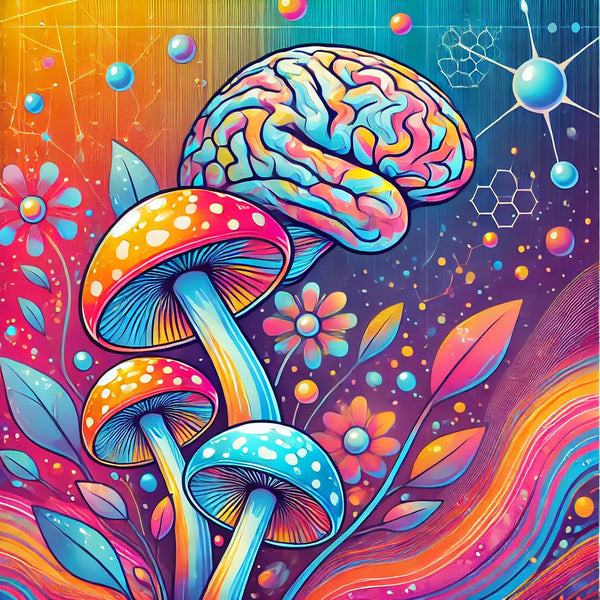
Psilocybin and Mental Health Treatments: Unlocking New Horizons
Introduction
In recent years, the field of mental health treatment has witnessed groundbreaking developments, particularly with the resurgence of interest in psychedelic substances like psilocybin. Known for its psychoactive properties, psilocybin, the active compound found in magic mushrooms, has shown promise in treating a variety of mental health disorders. This blog delves into the current research on psilocybin, its potential benefits, and the future of mental health treatments, aiming to provide a comprehensive overview of this exciting and transformative field.
Understanding Psilocybin
Psilocybin is a naturally occurring psychedelic compound found in over 180 species of mushrooms, commonly referred to as magic mushrooms. When ingested, psilocybin is converted in the body to psilocin, which is responsible for its psychoactive effects. These effects include alterations in perception, mood, and cognition, often leading to profound, mystical experiences.
The Historical Context
The use of psilocybin mushrooms dates back thousands of years, with evidence of their use in religious and spiritual rituals by indigenous cultures in Mesoamerica. In the 1950s and 1960s, psilocybin, along with other psychedelics, gained attention in the Western world for its potential therapeutic benefits. However, the subsequent legal restrictions and stigma associated with psychedelics halted research for several decades.
The Renaissance of Psychedelic Research
The turn of the 21st century marked the beginning of a renaissance in psychedelic research. Scientists and clinicians began to explore the therapeutic potential of psilocybin in a controlled and scientific manner. Recent studies have highlighted its efficacy in treating various mental health conditions, leading to a renewed interest in its potential applications.
Psilocybin and Depression
Major Depressive Disorder (MDD)
One of the most promising areas of psilocybin research is its application in treating major depressive disorder (MDD). Traditional antidepressants, such as SSRIs, often come with a range of side effects and may not be effective for all patients. Psilocybin offers a novel approach by targeting the serotonin receptors in the brain, potentially leading to more profound and long-lasting effects.
Recent clinical trials have shown that psilocybin-assisted therapy can lead to significant reductions in depressive symptoms. In a landmark study published in the journal JAMA Psychiatry, participants who received psilocybin therapy experienced rapid and sustained improvements in their depression scores compared to those who received a placebo.
Treatment-Resistant Depression
For individuals with treatment-resistant depression, psilocybin represents a beacon of hope. Traditional treatments often fail to provide relief for these patients, leading to chronic suffering. Studies have demonstrated that a single session of psilocybin therapy can result in substantial improvements, with some participants reporting lasting benefits for months.
Psilocybin and Anxiety
Generalized Anxiety Disorder (GAD)
Anxiety disorders affect millions of people worldwide, often causing debilitating symptoms that interfere with daily life. Psilocybin's impact on anxiety disorders, including generalized anxiety disorder (GAD), has been a focus of recent research. The compound's ability to induce profound, introspective experiences can help individuals confront and process their anxieties in a therapeutic setting.
End-of-Life Anxiety
One of the most compelling applications of psilocybin is in alleviating end-of-life anxiety among terminally ill patients. Studies conducted at institutions like Johns Hopkins University have shown that psilocybin-assisted therapy can provide significant relief from existential distress, leading to improved emotional and psychological well-being. Patients often report a greater sense of peace and acceptance of their mortality after undergoing psilocybin therapy.
Psilocybin and PTSD
Post-traumatic stress disorder (PTSD) is a severe mental health condition resulting from exposure to traumatic events. Conventional treatments, such as psychotherapy and medication, may not be effective for all individuals. Psilocybin-assisted therapy offers a new avenue for treating PTSD by allowing patients to revisit and reprocess traumatic memories in a safe and controlled environment.
Research has indicated that psilocybin can reduce the severity of PTSD symptoms and promote emotional healing. Participants in clinical trials have reported decreased anxiety, improved mood, and a greater sense of resilience following psilocybin therapy.
Mechanisms of Action
Neuroplasticity
One key mechanism through which psilocybin exerts its therapeutic effects is by promoting neuroplasticity—the brain's ability to reorganize and form new neural connections. This increased neuroplasticity can help break the rigid patterns of thinking associated with mental health disorders, leading to more flexible and adaptive cognitive processes.
Serotonin Receptors
Psilocybin primarily interacts with serotonin receptors in the brain, particularly the 5-HT2A receptor. This interaction leads to an altered state of consciousness and a cascade of neurochemical changes contributing to its therapeutic effects. By modulating the serotonin system, psilocybin can help regulate mood, perception, and cognition.
The Therapeutic Process
Set and Setting
The concept of "set and setting" is crucial in psilocybin-assisted therapy. "Set" refers to the individual's mindset going into the experience, while "setting" refers to the physical and social environment in which the experience occurs. Ensuring a supportive and safe setting is essential for maximizing the therapeutic benefits of psilocybin.
Integration Therapy
Integration therapy is a critical component of psilocybin-assisted treatment. It involves helping patients make sense of their psychedelic experiences and incorporating the insights gained into their daily lives. This process often includes follow-up sessions with a therapist to discuss and integrate the emotional and psychological insights from the psilocybin session.
Challenges and Considerations
Legal and Regulatory Hurdles
Despite the promising results, psilocybin research faces significant legal and regulatory challenges. Psilocybin is classified as a Schedule I substance in many countries, including the United States, making it difficult to conduct large-scale clinical trials. However, recent efforts to decriminalize and legalize psilocybin in various jurisdictions are paving the way for more research and potential therapeutic applications.
Ethical Considerations
The use of psychedelics in therapy raises critical ethical considerations. Ensuring informed consent, providing adequate support during and after the experience, and safeguarding against potential abuse are essential factors that researchers and clinicians must address.
The Future of Psilocybin in Mental Health Treatment
The future of psilocybin in mental health treatment looks promising. We expect more robust clinical evidence supporting its efficacy and safety as research expands. The potential for psilocybin to revolutionize the treatment of mental health disorders is immense, offering hope to millions of individuals who struggle with conditions like depression, anxiety, and PTSD.
Conclusion
Psilocybin represents a paradigm shift in mental health treatment. Its ability to induce profound, transformative experiences and promote emotional and psychological healing holds great promise for addressing some of the most challenging mental health disorders. As we continue to explore and understand the therapeutic potential of psilocybin, we move closer to unlocking new horizons in mental health care.
By embracing the science and therapeutic possibilities of psilocybin, we can pave the way for more effective, compassionate, and holistic approaches to mental health treatment. The journey is just beginning, and the future is bright with possibilities.
